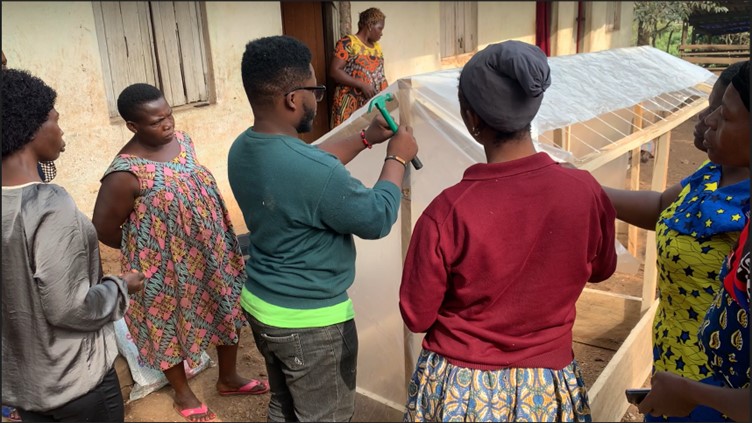
Photo Credit: Mumita Holdings Limited
In Buea, capital of the Southwest Region of Cameroon, producing nutritious food all year round has become increasingly difficult for many smallholder farmers, with rainfall patterns increasingly erratic and unpredictable. This problem is particularly significant in the region given that close to 300,000 Cameroonians are estimated to be in extreme hunger or emergency food insufficiency situations, and a total of 2.6 million people are uncertain as to whether they will have a meal every day.
Mumita Holdings Limited was founded specifically to support vegetable farmer networks in Cameroon to achieve SDG 2 (End hunger, achieve food security and improved nutrition and promote sustainable agriculture). To this end, it provides access to modern sustainable production tools to produce nutritious food all year round, helping to reduce the over reliance on artificial supplements to curb malnutrition.
Key to empowering the smallholder farmers to generate sustainable incomes is the provision of low-cost greenhouse technology solutions and irrigation systems, such as sprinklers and drip systems, in addition to sensitization work to raise awareness about climate change adaptation. This includes training farmers on reducing the use of pesticides and fertilizer utilized for production and decreasing the quantity of waste vegetables thanks to knowledge about post-harvest techniques.
“With the construction of low-cost greenhouses in communities, we have helped farmers upgrade from the use of mosquito nets to shield their seedlings from excess heat waves and heavy rains,” explains a representative from Mumita Holdings field Operator. “The low-cost greenhouses are made from long lasting local material with capacity to accommodate more seedlings and hence increase their productivity."
In addition, Mumita Holdings produces dehydrated vegetables to reduce post-harvest losses and increase their shelf life by incorporating a zero-waste plant. This converts African native vegetable staples into semi-finished, nutrient-rich products that meet market demands, reduces malnutrition, and enhances food security.
“Our biggest challenge at Prais has always been our inability to assure our customers consistent food supply but this year has been different,” says a member from a youth cooperative in Likombe. “For the first time ever, all our branches can boast of meeting the needs of our clientele with a variety of diets all season. What started as a trial product has turned out to be our biggest seller."
Of the approximately 50,000 farmers in Buea according to Southwest Regional Delegation of Agriculture, Mumita currently supports approximately 6,000. By providing free capacity building, offering consultation services, providing quality planting materials and regular follow ups, the company is able to grow and retain its customer base by building awareness among farming communities. This includes the local youth.
“We have been able to positively impact the society through employing the youth, increasing income and improving the livelihoods of vegetable farmers and local communities,” says Matiedje Gislaine, co-founder of Mumita Holdings Limited, which employs 33 young people.
With funds received from the Global Center on Adaptation through the Youth Adapt program, Mumita is set to purchase equipment such as packaging machines, vegetable dehydrators and freezers to increase production capacity and efficiency. Going forward, to deliver on its goal of meeting food security in Africa in an efficient way, Mumita is also seeking to raise additional financing in the form of equity and attract strategic partners.